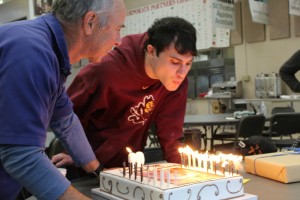
Seasonal Smiles For Adults with Autism & Their Families
By Denise D. Resnik
This holiday season marked my husband’s 60th birthday. Rob insisted: no surprise parties or gifts. His choice: spending his Sunday birthday filling SMILE Biscotti holiday orders from across the country.
Rob had a very successful law career, yet it never produced the kind of personal gratification he’s experiencing today through SMILE. He’s been involved with every aspect of SMILE: developing the acronym (Supporting Matt’s Independent Living Enterprise), training and encouraging our employees, creating packaging systems, increasing sales through retail outlets such as Sprouts, training Matt’s coworkers, celebrating the team’s accomplishments and making sure everyone’s having fun!
Rob and I smile often when working with the SMILE team. Their progress is inspiring. Slade is now a master packager. One of Matt’s former high school classmates, Slade’s autism limits his expressive language, but the guys don’t need a lot of words to enjoy Uno during breaks. For Lauren, who is a young adult with Asperger’s, SMILE is an opportunity to be part of a team, make new friends through shared experiences and enjoy the satisfaction of a job well done–like cracking hundreds of eggs during one mixing session! Culley, who is still in high school, likes the precision of measuring ounces and grams, and building his resume of work experiences.
Eric, who Matt met through SARRC’s CommunityWorks® program and who has overcome many challenges with his autism, is SMILE’s first employee. And SMILE is Eric’s first employer. Eric attends community college, drives, is SMILE’s lead home baker and has been promoted twice! He’s also been a mentor for Matt.

Photo by Sydnee Schwartz
As for Matt, SMILE has helped him increase his work stamina from 60 minutes to six hours. He serves as our best quality control checker, mixer and packer–and enjoys regular deliveries and trips to the store, food bank and ‘tootsie roll’ bank too.
These young adults represent the 500,000 youth with autism transitioning to adulthood this decade. According to Dr. Paul T. Shattuck, an associate professor in the A.J. Drexel Autism Institute and Drexel University School of Public Health, “so many of these young people have the potential to work and participate in their communities. Supporting this potential will benefit everyone – the person with autism, the family, employers and society.” Dr. Shattuck and his team report that sadly young adults with autism spectrum disorders have worse employment outcomes in the first few years after high school than do peers who have other types of disabilities.

Photo by Sydnee Schwartz
According to Drexel’s National Autism Indicators Report, just over half (53.4 percent) of the young adults on the autism spectrum surveyed ever worked for pay outside the home within the first eight years after leaving high school. Only about one in five (20.9 percent) young adults with ASDs worked full-time at a current or most-recent job.
The SMILE team is helping change some unhappy statistics and reminding us that when we dream bigger, live our priorities, apply our heartfelt passion and work together—more wishes really do come true. Happy birthday, big daddy!
Denise D. Resnik is the founder, president, and CEO of First Place® AZ, a charitable nonprofit real estate and community developer focused on individuals with autism and other neurodiverse populations. She was inspired to start First Place for her son, Matt, who was diagnosed with autism at age 2. In 1997, she co-founded the nonprofit Southwest Autism Research & Resource Center (SARRC). She is also the founder and CEO of DRA Collective, a Phoenix-based public relations, marketing, and communications firm.




